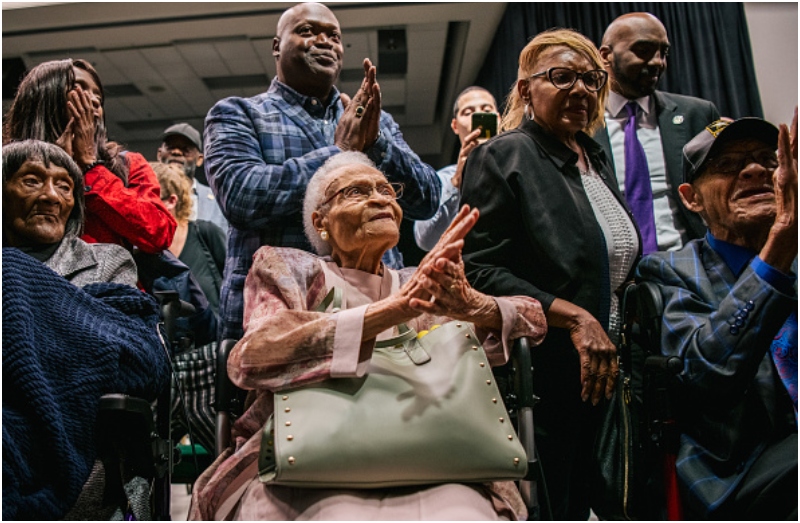In a historic hearing that could mark a significant step towards justice, the Oklahoma Supreme Court deliberated on Tuesday, April 2, 2024, over the final appeal for the right to trial for reparations sought by the two remaining survivors of the 1921 Tulsa race massacre.
Lessie Benningfield Randle and Viola Fletcher, both 109 years old, attended the momentous proceedings, representing the enduring quest for reparative justice stemming from one of the darkest chapters in American history.
Dressed in solemn attire and huddled under a blanket, Randle and Fletcher listened intently as lawyers presented their arguments for almost two hours.
The case holds immense significance, as it represents the survivors’ last opportunity to seek redress for the horrific events of May 31, 1921, when a white supremacist mob decimated the thriving Black community of Greenwood in Tulsa.
The lawsuit, launched almost four years ago, seeks restitution for the destruction and loss inflicted upon the Black residents of Greenwood, known as “Black Wall Street.”
Over 100 lawsuits have been filed over the years, but none have provided survivors with their day in court until now. The appeal before the Oklahoma Supreme Court aims to allow the survivors’ complaint to proceed to trial, where they seek reparations in the form of land and property restitution.
Randle and Fletcher expressed gratitude for the opportunity to access the legal system in their pursuit of justice.
Their plea for reparations underscores the ongoing impact of the massacre on the Black community, with many homes and businesses destroyed and countless lives forever altered.
The courtroom spectacle, juxtaposing the aging survivors against the defendants represented by city officials and the Oklahoma military, highlighted the enduring legacy of the massacre.
Lawyers argued over the survivors’ standing to bring the case and the responsibility of public entities in facilitating the violence and its aftermath.
Despite the passage of a century since the atrocity, the survivors’ quest for justice remains undeterred.
The outcome of the appeal will be closely watched across the nation, as it represents a pivotal moment in the ongoing struggle for reparations and accountability for historic injustices.
As the justices deliberated, the survivors departed, their hopes resting on the promise that their quest for justice will not be in vain.
The legacy of the Tulsa massacre endures as a reminder of the ongoing fight for equality and restitution in America.

